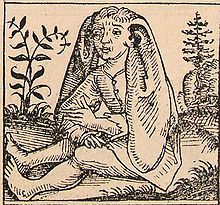Panoti


The Panoti , also Panochen , are a fabulous people of ear people who have been mentioned since ancient times and who populated fictional travelogues.
background
Hybrid beings and grotesque human creatures, such as dog-headed, one-footed and one-eyed people, have appeared since ancient times in descriptions of adventurous, but not personally experienced, journeys. Skylax , Megasthenes and Ktesias of Knidos told of people whose ears were big enough to wrap their bodies with them. Through these lying reports the Panoti , named after the Greek word for allohren , not only found their way into the world of legends, but also into the cosmographies of the Middle Ages.
description
Skylax attributes shovel-sized ears to the Panoti; according to Ktesias, their ears reach around the back and to the elbow. After mega standing, these people also sleep on their ears. Later classical authors assigned the Panoti to an island in the northern ocean as their home or let them live in Scythia . With a picture of a place ears Man 1483 entrance into the world chronicle of Hartmann Schedel .
As the stories about creatures with big ears spread, the descriptions increased. In the story of "Duke Ernst" by Gustav Schwab (1792–1850) the ear people appear as panochen , who have ears that reach to the ground and are defeated by the duke. In a primordial society , the Fanesians are identified as several meters high white giants who are said to have been able to wrap their entire bodies in their giant ears.
literature
- Heinz Mode: mythical animals and demons. The fantastic world of hybrid beings . Edition Leipzig, Leipzig 1977
Web links
- Panotti (English)
Individual evidence
- ↑ Heinz Mode: Mythical Animals and Demons. The fantastic world of hybrid beings . Edition Leipzig, Leipzig 1977; P. 212f.
- ↑ Heinz Mode: Mythical Animals and Demons. The fantastic world of hybrid beings . Edition Leipzig, Leipzig 1977; P. 223
- ^ Gustav Schwab : Duke Ernst in the Gutenberg-DE project
- ^ Karl Weule : The primordial society and its life care . In: Kosmos , Gesellschaft der Naturfreunde 1912; P. 8